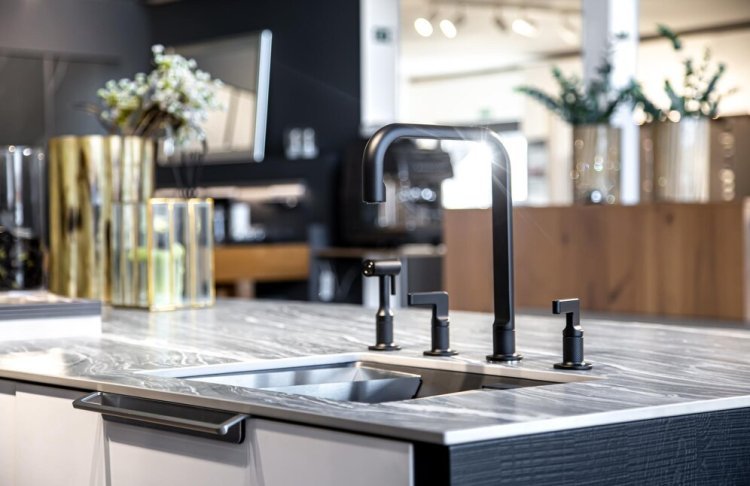Ceramic vs. Granite Worktops: Making the Right Choice for Your Home
the key factors to help you make an informed choice between ceramic worktops and granite alternatives, focusing on practical considerations over elaborate details.

Selecting the suitable material for your kitchen worktop is important. Two popular options that often come into consideration are ceramic and granite worktops. This guide breaks down the key factors to help you make an informed choice between ceramic worktops and granite alternatives, focusing on practical considerations over elaborate details.
Understanding Ceramic Worktops:
Ceramic worktops are crafted from a mixture of clay, minerals, and natural elements, making them durable and versatile for kitchen surfaces. Manufacturing involves firing the material at high temperatures, producing a complex and resilient surface. Ceramic worktops are known for resisting heat, scratches, and stains, making them a practical option for busy kitchens.
Granite Worktops:
On the other hand, granite worktops are hewn from natural stone, providing a unique and timeless appeal. Granite is formed through the cooling and solidification of magma, resulting in a durable and visually striking material. Granite worktops are known for their natural patterns, wide range of colours, and impressive resistance to heat and scratches. While they require sealing to prevent stains, granite remains popular for those seeking a touch of elegance in their kitchens.
Durability and Maintenance:
Durability and maintenance play significant roles in decision-making when comparing ceramic and granite worktops. Ceramic worktops generally resist scratches, heat, and stains, requiring minimal maintenance. Regular cleaning with mild detergent and water is usually sufficient to keep them in top condition. Granite worktops, while durable, benefit from periodic sealing to maintain their resistance to stains. Both materials are relatively low-maintenance, but the choice may depend on your willingness to perform occasional maintenance tasks.
Scratch Resistance:
Ceramic worktops are highly scratch-resistant, making them suitable for daily kitchen activities. The hardness of the material helps prevent scratches from knives, utensils, and other kitchen tools. Granite worktops, being natural stones, are also scratch-resistant but may be more susceptible to scratches than ceramic surfaces. It is essential to consider your cooking habits and how much wear and tear your worktop will endure.
Heat Resistance:
Both ceramic and granite worktops exhibit excellent heat resistance, allowing you to place hot pots and pans directly on the surface without causing damage. Extreme temperature changes may pose a risk of thermal shock, an example of which is putting a freezing-cold item on a hot surface. With ceramic worktops, this becomes even more applicable. Exercise caution and use trivets or hot pads to protect your worktop from sudden temperature variations.
Stain Resistance:
Ceramic worktops boast inherent stain resistance, making them less prone to discolouration from spills and food residues. While resistant to stains, granite worktops require periodic sealing to maintain this quality. The choice between the two may hinge on your preference for a material that is virtually stain-proof (ceramic) or one that, with proper care, maintains resistance to stains (granite).
Design Options:
Ceramic worktops offer various design options, including multiple colours, patterns, and finishes. Their versatility allows for the creation of sleek and modern or classic and traditional kitchen aesthetics. Their natural beauty and unique patterns make granite worktops a prized possession. The colour variations and veining in granite slabs contribute to a one-of-a-kind look that is hard to replicate, adding a touch of luxury to your kitchen.
Cost Considerations:
Cost is a crucial factor in any home improvement project. These worktops are generally more budget-friendly compared to granite alternatives. While both materials offer durability and longevity, the price difference may influence your decision. Consider your budget constraints and weigh them against each material's aesthetic appeal and unique qualities.
Installation:
Installation is another aspect to consider when choosing between ceramic and granite worktops. Both materials require professional installation to ensure a precise fit and proper sealing. When seeking a stone worktop supplier, inquire about their installation services and ensure they have experience working with the chosen material. A well-executed installation is essential for your chosen worktop's long-term performance and durability.
Consultation with a Stone Worktop Supplier:
Before making a final decision, consult with a reputable stone worktop supplier. They can provide valuable insights into the specific characteristics of ceramic and granite worktops, helping you make an informed choice based on your needs and preferences. Ask about their experience with each material, inquire about warranty information, and discuss any concerns you may have regarding maintenance or long-term performance.
Conclusion
Choosing between ceramic and granite worktops involves weighing practical considerations such as durability, maintenance, and cost. Both materials offer unique benefits, and the decision ultimately depends on your lifestyle, design preferences, and budget. By understanding the key differences and consulting with a reliable stone worktop supplier, you can mak
What's Your Reaction?











![Wireless Connectivity Software Market Size, Share | Statistics [2032]](https://handyclassified.com/uploads/images/202404/image_100x75_661f3be896033.jpg)



